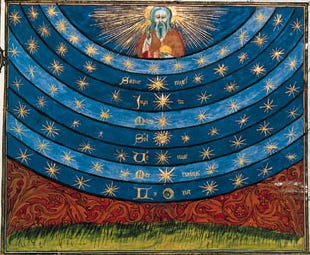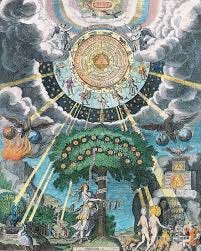The origin of the universe is a question that’s never been fully answered satisfactorily. If we believe everything was caused by something before it (determinism), then where is that “first cause” and why is it exempt from being caused by something else?
The big bang theory leaves us with more questions, too.
Over the past couple thousand years, for those who struggle with either “God(s) made the universe, no more questions, please,” or “the big bang happened, no more questions, please” there is a third option: Emanationism.
Emanationism has its own unanswered questions. But it’s an elegant concept that’s become a central part of some philosophies, as well as many esoteric and occult cosmologies throughout the years.
It may have its formal, documented origin in Neoplatonism, which is an Idealist (mind before matter) philosophy.
Here’s Emanationism in a nutshell:
There is the Absolute, the One, and from this, came successive emanations, like water dripping from itself, or overflowing, or light emanating from its source. And each stage emanates another stage, and so on, until it reaches matter, a solidified state and the furthest state from its origin.
That’s kind of an oversimplification by me based mostly on what I understand of Plotinus’ creation emanations in Neoplatonism.
There are elements of this cosmology that are compatible with Stoicism, Hermeticism, Kabbalah, Hinduism, and others, making it a compelling universal view for esoteric doctrines of a perennial philosophy, and one that can compete with Judeo-Christian Creationism.
As such, Emanationism is central to Madame Blavatsky’s The Secret Doctrine, and thus Theosophy, and through it Anthroposophony. It’s also seen in Rosicrucianism.
Emanationism vs. Creationism?
So, what exactly is the difference between Emanationism and traditional Creationism?
Creationism could be described as the belief that a deity, with knowledge or sentience, willed the creation of the universe perhaps as a representation of itself in all its perfection and glory.
Emanationism says that instead of a deity, the One the “Monad,” or “cosmic mind” is the eternal principle that necessarily “emanates,” unwilled, a lower level of existence or “spiritual” realm, if you will, which emanated another, lower realm, ultimately ending in the final emanation, which is the solidified material world and our experience of it.
Think of a person molding a toy soldier from clay, vs a toy soldier forming from a lump of clay, inevitably.
If you still don’t see a difference, you’re not alone, but to many philosophers there is a fundamental difference.
Journeys through the spirit realms
The emanating divisions into planes of existence make for fascinating implications in esoteric and occult beliefs, as well as the plethora of art and literature derived from it.
For example, the “astral plane” being one level of the emanations, or similarly, the “spheres.” And depending on the school of belief, one’s spirit may even journey through these planes, for example, the soul’s mission being to journey back through the realms, spheres, planes until it rejoins its source.
- Joe
A note to readers: If you like Vetus Mysteria and want to support it, the very best thing you can do is to share it with people who might be interested. It would make my day.






